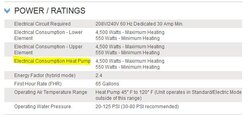When I purchased my house in 2005 it came with a 3 panel solar hot water system with 120 gal tank. It worked up until last summer when the storage tank finally gave up and split. That is a great return on investment for a system that was installed in 1986! A new storage tank alone would run 2K, and the roof panels are getting quite tired so it was time to decommission it. I drained it out and GULP....flipped the switch on the oil boiler GAAH. After living for so long with free hot water in the summer, I was not happy to see the oil tank going down. I heat almost entirely with wood so all of my oil use is for hot water.
GAAH. After living for so long with free hot water in the summer, I was not happy to see the oil tank going down. I heat almost entirely with wood so all of my oil use is for hot water.
I currently have my hot water heated with my 2005 AO smith boiler with hot water. No external storage tank is being used now that the solar is out.
I am just about ready to pull the trigger on the GE geospring 50 gal waterheater:
http://www.geappliances.com/heat-pump-hot-water-heater/
I do have a few concerns and need to make up my mind by the end of the year to get the 300 tax credit. There is no credit available from my local utility.
Concerns:
I only have 100A service here and the cost to upgrade is huge. I would probably want to run this unit in heat pump mode during the summer when I am running the central air. I would keep the oil for backup if needed.
If I get this unit, my oil boiler will only be used when we go on vacation or have lots of people staying here and need the hot water. I am concerned about the long periods of inactivity. When on solar, the boiler would be off for months at a time....so I guess it would be ok.
Sorry for the long rant...I tend to over think everything!
 GAAH. After living for so long with free hot water in the summer, I was not happy to see the oil tank going down. I heat almost entirely with wood so all of my oil use is for hot water.
GAAH. After living for so long with free hot water in the summer, I was not happy to see the oil tank going down. I heat almost entirely with wood so all of my oil use is for hot water.I currently have my hot water heated with my 2005 AO smith boiler with hot water. No external storage tank is being used now that the solar is out.
I am just about ready to pull the trigger on the GE geospring 50 gal waterheater:
http://www.geappliances.com/heat-pump-hot-water-heater/
I do have a few concerns and need to make up my mind by the end of the year to get the 300 tax credit. There is no credit available from my local utility.
Concerns:
I only have 100A service here and the cost to upgrade is huge. I would probably want to run this unit in heat pump mode during the summer when I am running the central air. I would keep the oil for backup if needed.
If I get this unit, my oil boiler will only be used when we go on vacation or have lots of people staying here and need the hot water. I am concerned about the long periods of inactivity. When on solar, the boiler would be off for months at a time....so I guess it would be ok.
Sorry for the long rant...I tend to over think everything!



